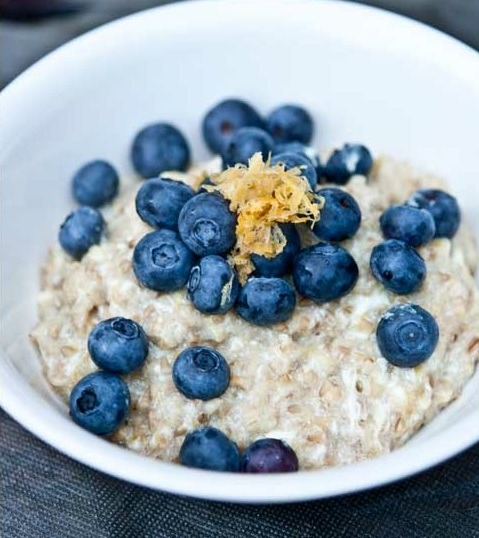Calories
Aim for a range between 300 and 400 calories. If you're trying to lose weight, stick with the 300 to 350 range, and if you're trying to maintain weight, especially if you're working out, shoot closer to 350 to 400 calories.
Carbs
About 45 to 55 percent of your breakfast calories should be devoted to carbs, which is about 40 to 55 grams of carbs. Skip sugary and overly processed foods or those made with enriched white flour, and choose whole grains, fruits and veggies.
Protein
About 15 to 20 percent of your breakfast calorie amount should be protein, which works out to about 13 to 20 grams. Getting enough protein at breakfast is important for keeping you satisfied throughout the morning. And studies have shown that getting at least 20 grams of protein at breakfast may help you lose weight as well. Eggs, dairy products, soy milk, protein powder in smoothies, nuts and seeds, and whole grains are great sources of protein.
Fats
Shoot for about 10 to 15 grams, which is about 30 to 35 percent of your total breakfast calories. Instead of saturated fats like bacon and cheese, go for monounsaturated fats (MUFAs) like olive oil, nuts and seeds and the butters made from them, and avocado.
Fibre
Aim for about 25 percent of your recommended daily total of 25 grams per day. That works out to about six grams, but it's OK to go above that, as long as it doesn't bother your digestive system. Berries, pears, apples, greens and other veggies, nuts, seeds and whole grains can help you reach that goal.
Sugars
If you follow the equation for carbs above, then you won't have to worry about going overboard on sugars, especially if you're eating a combination of foods like fruits, whole grains and dairy products. But for a ballpark number to keep in mind, stick to 36 grams or fewer. And when it comes to added sugar, try not to exceed six grams — that's about 1.5 teaspoons' worth of any sweetener (white sugar, brown sugar, maple syrup, honey or agave).
Timing
Ideally you should eat breakfast within 30 to 60 minutes of waking up. If you're not keen on eating anything big first thing, split this meal up into two parts, having something light close to waking up and the other half about an hour and a half later. This also works well if you're a morning exerciser and prefer not to have a full stomach while you work out. If you're exercising, you can aim to have the more carbohydrate-based portion of your breakfast (fruit, toast, etc.) prior to working out and the more protein-centric portion afterward.
A Few Examples of Perfect Breakfasts
- Steel Cut Oats With Fruit and Nuts: Steel cut oats not only have more fibre than an equal amount of rolled oats, but they also have more protein since you're eating more of the original grain. Cook one-half cup steel cut oats in a mixture of one-half cup water and one-half cup unsweetened soy milk. Top with one-half cup blueberries, one tablespoon chopped walnuts, and one teaspoon drizzle of maple syrup.Calories: 328
Total fat: 9.7 g
Saturated fat: 1.0 g
Carbs: 51.1 g
Fibre: 7.2 g
Sugars: 16.6 g
Protein: 11.8 g
Source: Instagram user airzinnn
- Mexi-Egg Wrap: Scramble one egg and one egg white with two tablespoons black beans, one-quarter cup chopped tomato, and two tablespoons onion, until eggs are set. Stir in one cup spinach. Fill a nine-inch whole-wheat tortilla with the egg mixture and top with one-quarter of an avocado, cubed, and one tablespoon salsa. Add salt, pepper, cumin and chili powder to taste.Calories: 345
Total fat: 15.7 g
Saturated fat: 3.5 g
Carbs: 36.8 g
Fibre: 9.7 g
Sugars: 3.2 grams
Protein: 17.4 g
Photo: Jenny Sugar
- Smoothie and a Hard-Boiled Egg: Pair a carrot cake smoothie made with two medium carrots, half a frozen banana, two cups spinach, one cup unsweetened soy milk (you can use almond), half a scoop plant-based protein powder, one-eighth cup golden raisins, cinnamon, nutmeg and cloves. This is easy to split — have half of the smoothie before your workout, then have the rest plus the egg after the workout.Calories: 368
Total fat: 12.6 g
Saturated fat: 5.1 g
Carbs: 49.5 g
Fibre: 9.4 g
Sugars: 25.5 g
Protein: 25.4 g
Breakfast Mistakes to Avoid
- Skipping out: When you sleep, your body slows down while you're not eating. So when you wake up, if you don't break the fast (yup, that's where the name comes from), your body will burn calories slowly. To jump-start your metabolism and get your body burning calories, you need to eat. Not fuelling up also deprives your brain of glucose, which is why you feel foggy-headed and cranky. Think of breakfast as an opportunity to get your fill of valuable nutrients such as calcium, iron, and vitamin C.
- Skimping: You know skipping breakfast entirely is a no-no, but not eating enough will also backfire. It'll leave you feeling hungry soon after eating, which will cause you to need more food and can translate to more calories consumed over the course of the entire day. Stick to the formula above, and you'll not only feel satisfied longer, you'll also have more energy for the workouts that can make you drop pounds even faster.
- Imbalanced meal: Leaving out a key component of the breakfast formula such as avoiding all carbs or going too heavy such as having an all-protein meal means you're not going to get enough satisfaction or nutrition from this first meal. Following the formula above will allow you to eat a balanced meal while also helping you see weight-loss results.
Try these healthy breakfast options and let me know how you find them by commenting down below! I would love to hear feedback from you guys!
Source
http://www.popsugar.com.au/fitness/What-You-Should-Eat-Breakfast-Lose-Weight-35882193




No comments:
Post a Comment